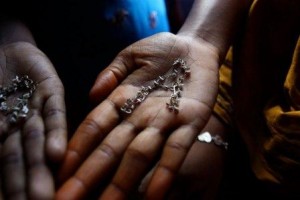In Bangladesh, 49% of the 150 million unique men and women live below the line for real. That’s why we want to go quiet today. Instead, we want to let Robin, Managing Director of Basha – a project very close to our hearts – speak to you from Dhaka.
We’ve been praying with new intensity for Bangladesh every day for a week now – for the world’s eyes to be opened to the injustices of international trade systems and the resulting working practices.
And this week’s rich girl poor girl context has only increased our heartbreak about what happened in Dhaka last week, and the bigger issues behind it.
Please join us today in praying for Basha, Dhaka, Bangladesh and all who live below the line for real….
From Robin in Dhaka…. Following the latter course
‘As an afternoon rain storm breaks the sticky heat of the day, I long for coolness to break through and bring calm to the violence and unrest in Bangladesh. As people’s lives still ebb away, lying trapped in the Savar building that collapsed, thousands have taken to the streets with sticks and bricks, easing their rage with shattered glass. And why not break all the windows, when your powerlessness rises up hot and violent? When greed forced thousands of people, human beings, sensing the danger, to enter an unsafe building. Poor, powerless, they couldn’t refuse; not if they wanted their pay check, not if they wanted to feed their family.
‘Those protesting know their life is just as cheap as those dying. They are valued only for the 10-12 hours of work they can put in each day producing cheap garments, making as much profit for the owners and retailers as possible, creating the bargains we all love. Apurbo Shohag expresses this rage on Facebook: “In this country death comes easy. Because the cheapest thing is the human life. Not only today’s disaster in Savar, we have heard many times after the previous factory disasters that those who responsible including the owners will be brought to justice. But we don’t see them get punished. So such disaster happen again and again. The bodies pile up in greater numbers.”And what do you do when this powerless hits you in the face? You smash everything you can.
‘Fifty people were injured in clashes with police at the collapsed factory site as people don’t feel the rescue is going as it should. On Friday a protester was run over by a bus, resulting in a rampage through Gulshan, a section of town usually protected from such violence. On Saturday Basha offices were closed as the women feared the protesters would turn to us as one of the few places open in the area.
‘I feel the same hot anger that wants to lash out blindly whenever I read the life histories of Basha employees. The multiple people who abused them, sold them, violated them. Knowing there wasn’t anything to keep them safe, no one to rescue them. How powerless they really were against an evil fate, only years later to come to a safe place bearing scars I would give anything to erase.
‘I have a fresh understanding for the huge challenge Mahatma Gandhi, Martin Luther King. Jr., and others who led nonviolently had, a renewed respect for what they accomplished. To quiet this rage and to filter it into a powerful, non violent response is huge! Smashing a bus, or the local Pizza Hut, or a factory that IS providing good, safe jobs- how does that help anything? But to transcend the instinct of rage for intentionality- that seems impossible.
‘I have no answers. People in Bangladesh need jobs. Factories won’t come here with all the corruption, political issues, poor infrastructure, if prices aren’t low. The fact that so many people do put up with abuses indicates just how desperate they are for work. But o, if they only could work, not with resignation to their powerlessness, not with misguided rage at all they encounter, but instead, build a strong, powerful, and peaceful voice. May we all be inspired by the words of Martin Luther King Jr., “As my sufferings mounted I soon realized that there were two ways in which I could respond to my situation either to react with bitterness or seek to transform the suffering into a creative force. I decided to follow the latter course.” ‘
(Republished with kind permission from Laura Bardwell, and with huge thanks, love, and prayers for her, and the leaders and ladies of Basha – the house that hope built. God bless Bangladesh.)
